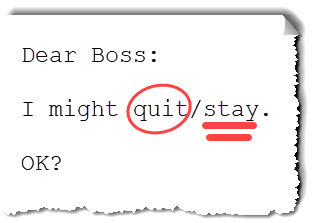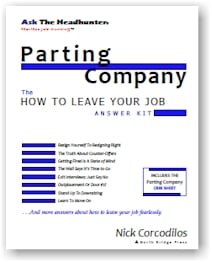Question
I’m getting conflicting advice about giving notice before I resign my job after accepting a new job offer. A career coach told me I have to give notice or ruin my reputation. (“Don’t’ burn bridges.”) A guy I used to work with got burned when he gave notice: his boss demanded he stay a month to train somebody! Another was immediately escorted to the door by company security. (He was counting on a couple of weeks’ more salary.) Not all stories are bad but I don’t like to take risks when I can avoid them. I’d prefer to just make a clean cut without notice. Do you have any tips to play it safe?
Nick’s Reply
 I’ll summarize what I think are six important considerations that should help keep you out of trouble when giving notice that you’re quitting your job. I’ll emphasize up front that you must do your own calculation and decide for yourself what is your best course of action.
I’ll summarize what I think are six important considerations that should help keep you out of trouble when giving notice that you’re quitting your job. I’ll emphasize up front that you must do your own calculation and decide for yourself what is your best course of action.
1. Check your obligations before giving notice
It’s astonishing how many people think their basic freedoms vanish when it comes to their jobs. Just as you’re free to move from one state to another when you wish, without anyone’s permission, you’re free to change jobs anytime you wish (with or without giving notice) — unless you signed an agreement accepting limits on this choice. Check the obligations you agreed to.
Do you have an employment contract? (These are rare in the U.S. and usually involve executive positions.) If you do, read it carefully, or have an employment attorney review it. Keep in mind that the job offer you signed may be a kind of contract, and it may incorporate by reference your company’s employee policy manual — which may say something about a notice requirement. It matters what you sign and agree to when you accept a job.
2. Check for “employment at will” law
In most U.S. jurisdictions employment is “at will” — your company can terminate you at any time for any or no reason, without giving you any notice. But if you work in an “at will” state, you can likewise quit. Whether you should quit without notice is usually your choice. Make sure you know the employment law in your state — and review what you have contractually agreed to.
3. Check your company’s history
Nose around before you decide. Has your employer made life difficult for other employees that quit without notice? Some employers actually handle resignations with aplomb. It’s worth finding out your company’s actual practices because that may factor into how you calculate your risk.
4. Check your reputation risk
That career coach is correct: resigning without notice can damage your professional reputation. (Your employer may put you on a no-rehire list.) If word gets out, it might damage your rep with other employers.
However. This is a risk you must calculate. While quitting without notice can be a crappy thing to do, it might be prudent anyway. Sometimes we have to make tough choices. If giving notice might put you in serious jeopardy, avoiding the risk may be preferable to doing what’s expected.
Now let’s talk about potential jeopardy.
5. Check the consequences
Giving notice because “it’s the right thing to do” might trigger consequences you haven’t considered. Like the friend you mentioned, you may not get two weeks yourself — of additional salary or time between jobs that you expected. You may be told to leave immediately without a chance to gather your personal belongings. (“HR will mail your stuff to you.”)
If you work in sales or get paid a bonus, policy might dictate that you don’t get the money unless you’re employed there on the date it is set to be paid — and unless you provide notice. Quitting without notice may trigger instant recovery of educational or relocation investments the company made in you. If you work on a “draw” in sales, you might actually owe the company money it advanced you against future commissions. (See The 6 Gotchas of Goodbye.)
An employer cannot withhold your pay, but you must understand what constitutes pay in your specific case. But don’t run from choices like these. Depending on the financial rewards and professional opportunities provided by your new job, it may be worth resigning without notice.
6. Check the spite factor
Tendering a resignation usually elicits this question: “Where are you going to work next?” It may seem as innocent as HR’s request that you sit for an “exit interview” and explain yourself. But you owe no one any explanations, or information about your future.
I’ve seen spiteful employers go out of their way to nuke a departing employee’s new job offer. Is there any chance your old boss would contact your new employer and try to poison your well? Please think about this. That offer you accepted could be rescinded. In my experience, it’s rare. But if it does happen, the consequences for you could be dire. A risk might seem small, but when the cost is potentially immense, I don’t think taking a chance is prudent..
My advice: Don’t tell anyone even remotely associated with your old company where you’re going until you’re already there. “No offense, but I’ll be happy to get in touch once I’ve settled into my new job and we can have lunch.”
I’m not suggesting you should never give notice when resigning. But if you decide to part company suddenly, take time to evaluate the risks, and to calculate the potential costs and benefits of quitting without notice. Is your new job worth it?
Do you give notice when you resign a job? Have you been happy with the outcome? Are there circumstances when you think not giving notice in advance of leaving an employer is prudent?
: :




 Think about it — my current employer made it clear that I’m a high performer. That said, my boss’s boss should have had this conversation much sooner and I told him so. He agrees!
Think about it — my current employer made it clear that I’m a high performer. That said, my boss’s boss should have had this conversation much sooner and I told him so. He agrees!
 I left a decent-size company for a start-up some time ago. Like any other start-up, the work requires a lot of hours. The work itself is very challenging and truly leading-edge technology. However, since the birth of my daughter, I’ve realized that I’m much more of a family man than I imagined. I can clearly see that the hours will only get worse as time goes on.
I left a decent-size company for a start-up some time ago. Like any other start-up, the work requires a lot of hours. The work itself is very challenging and truly leading-edge technology. However, since the birth of my daughter, I’ve realized that I’m much more of a family man than I imagined. I can clearly see that the hours will only get worse as time goes on.
 I am planning to quit my job, but my boss said to hold off on quitting until we can at least hire my replacement. Otherwise, he said, “I will make things very, very bad for you.” How should I respond to this?
I am planning to quit my job, but my boss said to hold off on quitting until we can at least hire my replacement. Otherwise, he said, “I will make things very, very bad for you.” How should I respond to this? I finally landed my next job after months of interviews. Now I don’t want to blow it until I’m actually on board at the new company. I say that because the last time I changed jobs I made the mistake of telling my boss too soon, before I even had a job offer. I thought he respected me enough to wish me well, but it blew up in my face. He told HR and I was walked out the door. I can use some advice. How should I handle it this time?
I finally landed my next job after months of interviews. Now I don’t want to blow it until I’m actually on board at the new company. I say that because the last time I changed jobs I made the mistake of telling my boss too soon, before I even had a job offer. I thought he respected me enough to wish me well, but it blew up in my face. He told HR and I was walked out the door. I can use some advice. How should I handle it this time?





